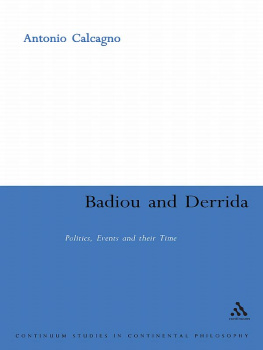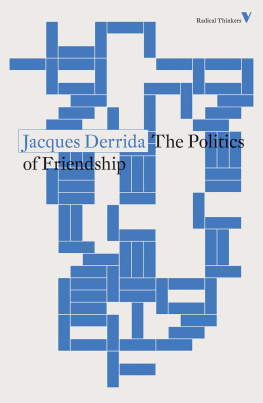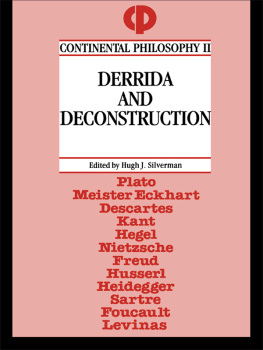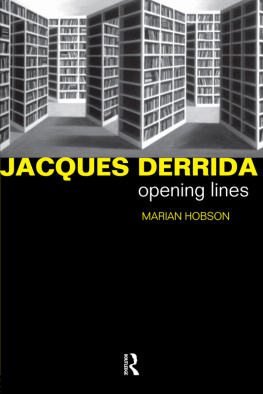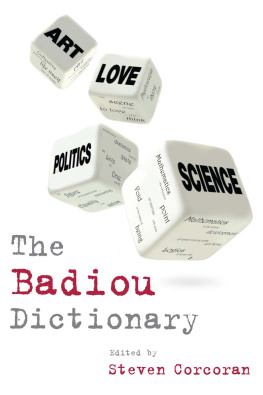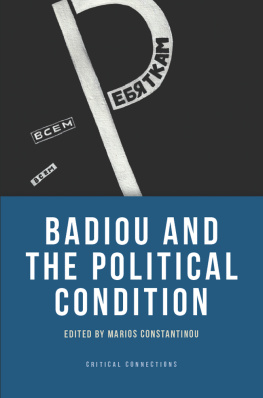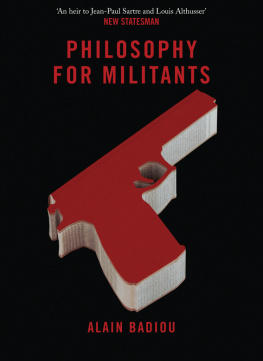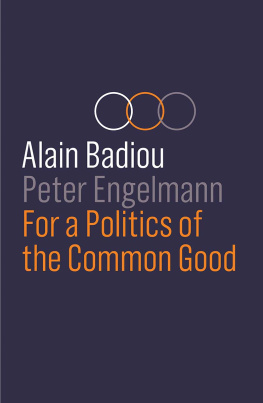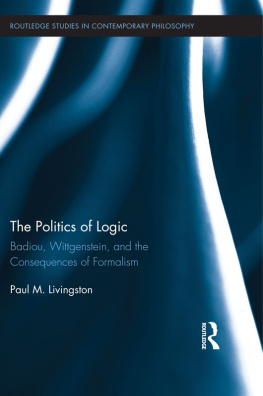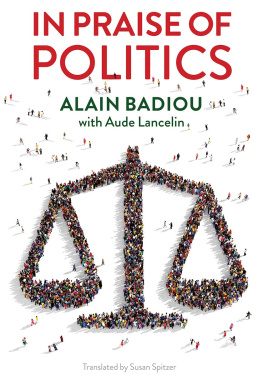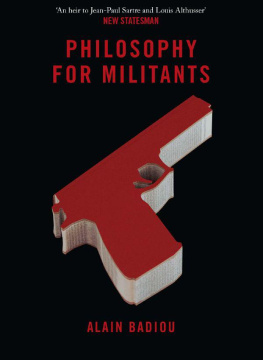Calcagno - Badiou and Derrida: politics, events and their time
Here you can read online Calcagno - Badiou and Derrida: politics, events and their time full text of the book (entire story) in english for free. Download pdf and epub, get meaning, cover and reviews about this ebook. year: 2007;2011, publisher: Bloomsbury Publishing;Continuum, genre: Religion. Description of the work, (preface) as well as reviews are available. Best literature library LitArk.com created for fans of good reading and offers a wide selection of genres:
Romance novel
Science fiction
Adventure
Detective
Science
History
Home and family
Prose
Art
Politics
Computer
Non-fiction
Religion
Business
Children
Humor
Choose a favorite category and find really read worthwhile books. Enjoy immersion in the world of imagination, feel the emotions of the characters or learn something new for yourself, make an fascinating discovery.
Badiou and Derrida: politics, events and their time: summary, description and annotation
We offer to read an annotation, description, summary or preface (depends on what the author of the book "Badiou and Derrida: politics, events and their time" wrote himself). If you haven't found the necessary information about the book — write in the comments, we will try to find it.
Calcagno: author's other books
Who wrote Badiou and Derrida: politics, events and their time? Find out the surname, the name of the author of the book and a list of all author's works by series.
Badiou and Derrida: politics, events and their time — read online for free the complete book (whole text) full work
Below is the text of the book, divided by pages. System saving the place of the last page read, allows you to conveniently read the book "Badiou and Derrida: politics, events and their time" online for free, without having to search again every time where you left off. Put a bookmark, and you can go to the page where you finished reading at any time.
Font size:
Interval:
Bookmark:
BADIOU AND DERRIDA
Also available from Continuum:
Deconstruction and Democracy, Alex Thomson
Deleuze and Guattaris Philosophy of History, Jay Lampert
Deleuze and the Meaning of Life, Claire Colebrook
Derrida and Disinterest, Sean Gaston
Husserls Phenomenology, Kevin Hermberg
New Heidegger, Miguel de Beistegui
Sartres Ethics of Engagement, T. Storm Heter
Wittgenstein and Gadamer, Chris Lawn
Deleuze and the Unconscious, Christian Kerslake
Sartres Phenomenology, David Reisman
BADIOU AND DERRIDA
POLITICS, EVENTS AND THEIR TIME
ANTONIO CALCAGNO

Continuum International Publishing Group
The Tower Building, 11 York Road, London SE1 7NX
80 Maiden Lane, Suite 704, New York, NY 10038
www.continuumbooks.com
Antonio Calcagno 2007
All rights reserved. No part of this publication may be reproduced or transmitted in any form or by any means, electronic or mechanical, including photocopying, recording, or any information storage or retrieval system, without prior permission in writing from the publishers.
British Library Cataloguing-in-Publication Data
A catalogue record for this book is available from the British Library.
ISBN-10: HB: 0-8264-9617-2
ISBN-13: HB: 978-0-8264-9617-1
Library of Congress Cataloging-in-Publication Data
Calcagno, Antonio, 1969
Badiou and Derrida : politics, events, and their time / by Antonio Calcagno.
p. cm.
Includes bibliographical references.
ISBN-13: 978-0-8264-9617-1
ISBN-10: 0-8264-9617-2
1. Political science-Philosophy. 2. Badiou, Alain. 3. Derrida, Jacques. I. Title.
JA71.C28 2007
320.0922-dc22
2006034646
For Fadi Abou-Rihan
tuo
Contents
Acknowledgements
This book would not have been possible without the careful and patient nurturing of my philosophical teachers: Jay Lampert and Caroline Bayard. I thank them for their generosity and am grateful for their gifts of spirit. I am also indebted to my friends Camilla Mryglod and Kathy Daymond for helping me write and produce this text. The Universities of Guelph and Scranton are to be thanked for their invaluable intellectual and material support. Roy, Assunta, Daniel and Lucia have always encouraged me and have greatly assisted in sustaining my own research over the years. I would also like to thank Continuum for agreeing to take on this project. I am forever grateful for the kind and loving encouragement of Fadi Abou-Rihan. He watched this text grow into being, providing invaluable commentary and assistance.
Finally, I would like to acknowledge the kind permission of the following journals for allowing me to reproduce in part some of my previously published articles.
Jacques Derrida and Alain Badiou: Is there a Relation Between Politics and Time?, Philosophy and Social Criticism, vol. 30, no. 7, 2004, 799815.
Can Alain Badious Notion of Time Account for Political Events?, International Studies in Philosophy, vol. XXXVII/2, 2005, 114.
Part One
Introduction: time and politics
From its beginnings to its more recent incarnations, philosophy has sought to think through the nature of and the relationship between time and politics. For example, Platos political writings place a heavy emphasis on time, especially time eternal. The good society, that is, the good polis, will be fashioned and modelled according to the permanent and unchanging true nature of the eternal forms. Eternity plays two fundamental roles in Platos political vision. First, it is offered as the key to guaranteeing permanence and unchangeability, especially in light of the restless and relentlessly changing political world that Plato lived through a world marred by the abuse of the thirty tyrants, sophistic politicians (as opposed to men of politics) and the unjust execution of his teacher Socrates. Eternity, and the concomitant permanence and unchangeability that come with it, are seen as an alternative to the everyday politicking and scheming that, according to Plato, corrupted Athenian politics during his lifetime. Second, eternity, understood as infinite time, ensures the possibility that there would one day come a time when Platos prescriptions could come about. Plato writes,
Accordingly, if ever in the infinity of time, past or future, or even today in some foreign region far beyond our horizon, men of the highest gifts for philosophy are constrained to take charge of a commonwealth, we are ready to maintain that, then and there, the constitution we have described has been realised, or will be realised when once the philosophic muse becomes mistress of a state. For that might happen. Our plan is difficult we have admitted as much but not impossible.
Emerging French thought of the last decade or so is no stranger to the debates on the nature of and relationship between politics and time. This work will have as its focus an examination of recent developments in French thought as making significant contributions to the perennial philosophical problem of the nature of and relation between politics and time. Jacques Derrida and Alain Badiou have devoted significant consideration to the problem of time and politics, especially in their more recent works.
This book tries to achieve two things. First, it makes a contribution to contemporary Continental philosophy as this is the first book, to my knowledge anyway, that tries to bring together in a scholarly way the more recent work on politics by Derrida and Badiou. The latter is slowly emerging as a central figure in French philosophy as well as in Anglo-American philosophy. With the recent publication (2006) of his Logiques des mondes {Logics of the World) Badiou has amplified and amended various claims made in his great opus Being and the Event. Derrida, prior to his death, was developing and expanding his idea of the democracy to come as a political expression of his decon-structive programme. Both thinkers have devoted a substantial amount of their oeuvre to politics and the question of the nature of the political. My work would be a first in that it will comprehensively show how the two philosophers political views diverge and converge, thereby providing a comprehensive exposition of their respective political systems.
Second, and most importantly, my work advances a theory about the relationship between political events and time that can account for both political undecidability and decidability. Both Badiou and Derrida give the event a central role in structuring politics and political thinking. For Badiou, events make politics possible and thinkable. They give both a decidable and intelligible structure to politics while still accounting for indeterminacy and multiplicity. Derrida, unlike Badiou, believes that events themselves are structured by the double bind of possibility and impossibility, radically calling into question the very naming of events or even giving them any definite or set meaning as does Badiou. I argue that Badiou can overcome the Derridean aporia of the double bind. Central in this overcoming is the notion of time as a subjective intervention. Derridean time as temporally and spatially differentiating cannot sufficiently account for the fidelity to and legacy of events as temporally rupturing despite Derridas claims to the contrary as proposed in his notion of heritage. Though Badiou can be employed to overcome Derridas political aporia, Badiou himself has to account for an appropriate or strategic pre-political time that allows him to formulate his view of time as a subjectivating intervention. I argue that an amplified and developed notion of the Greek idea of the
Next pageFont size:
Interval:
Bookmark:
Similar books «Badiou and Derrida: politics, events and their time»
Look at similar books to Badiou and Derrida: politics, events and their time. We have selected literature similar in name and meaning in the hope of providing readers with more options to find new, interesting, not yet read works.
Discussion, reviews of the book Badiou and Derrida: politics, events and their time and just readers' own opinions. Leave your comments, write what you think about the work, its meaning or the main characters. Specify what exactly you liked and what you didn't like, and why you think so.

